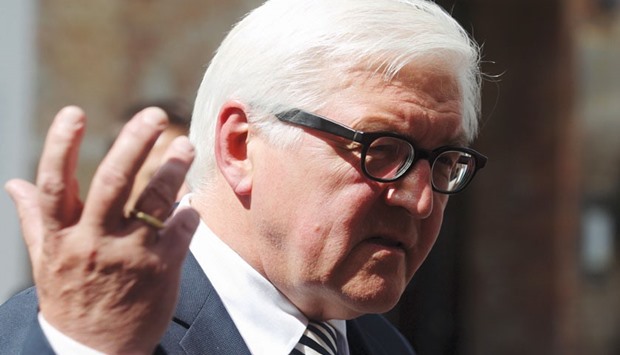Turkey and Germany’s relationship – essential to curbing mass migration to Europe – has grown so bad the two countries have virtually “no basis” for talks, German Foreign Minister Frank-Walter Steinmeier said yesterday.
Germany has serious concern about mass arrests carried out by Turkish officials after a thwarted coup last month, Steinmeier said.
At the same time, Turkey feels Germany has not taken the July 15 coup attempt seriously, and its government is angered by German media reports suggesting that it was orchestrated by Turkish President Recep Tayyip Erdogan.
“We are talking with each other like emissaries from two different planets,” Steinmeier said, speaking in the northern German city of Stralsund. “There is essentially no basis for understanding ... no basis for discussions.”
Relations between Germany and Turkey have been tense for months following a June 2 vote by the German parliament to brand the 1915 massacre of Armenians by Ottoman forces as genocide, a move sharply criticised by Erdogan and other Turkish officials.
Chancellor Angela Merkel met with Erdogan during a Nato summit in Warsaw shortly before the abortive coup to try to repair the relationship, but she later said the differences would not “just disappear”.
Since that vote, Turkey has denied German parliamentarians access to the Incirlik airbase, where 250 German soldiers are taking part in Nato operations against Islamic State (IS) militants.
Steinmeier said he had last spoken with his Turkish counterpart last Friday and assured him that Germany did view the attempted coup as a serious matter, while insisting on the right to question whether its response had been appropriate.
“We must be allowed to ask if mass arrests of tens of thousands of lawyers, judges, journalists, soldiers, closure of broadcast stations and shutdowns of newspaper – were carried out under the rule of law,” he said. “We are trying to end the current situation, which is unsatisfactory but also dangerous, in which we are only communicating via megaphones, or microphones and cameras.”
Steinmeier reiterated that reinstatement of the death penalty in Turkey would prevent its entry into the European Union.
But he warned against prematurely halting discussions with Ankara, as top Austrian officials have demanded.
That would eliminate any leverage Europeans have regarding the many thousands of people who had been arrested in Turkey, he said.
He also said Turkey and the EU would continue to implement an agreement limiting the flow of migrants to Europe.
Thus far, he said, Turkish Foreign Minister Mevlut Cavusoglu had made a single comment threatening to back out of the agreement, but neither Erdogan or Turkey’s prime minister had made similar remarks.

Steinmeier: We are talking with each other like emissaries from two different planets.
